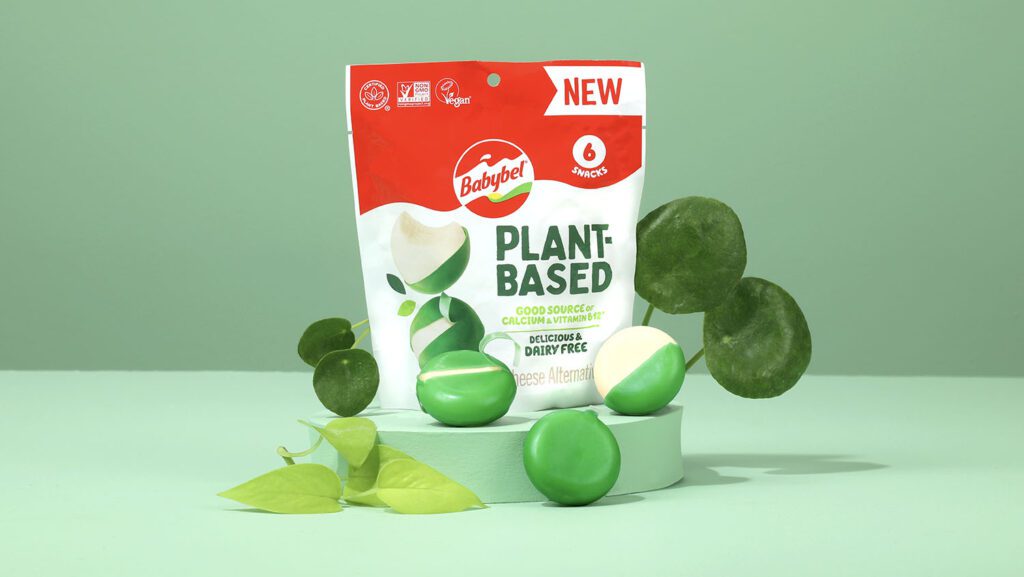People are passionate—really passionate—about cheese. Humans even invented cheese in a spray can so we can inject it right into our mouths. It’s often the last type of food to go when someone is looking to cut animal products out of their diet. And food scientists have been working diligently in the lab to create dairy-free cheese that can stand up to the kind that comes from a cow. They’re getting closer and closer every month. Now, Bel Group is giving us vegan Babybel and Laughing Cow cheese.
The French cheese company is one brand among many seeking to court consumers asking for more sustainable food. It started with a vegan version of Boursin, which hit refrigerated shelves in stores like Trader Joe’s in 2020. Then, Plant-Based Babybel cheese launched in the UK late last year—leaving many in the US asking “hey, what gives?” But, the moment is finally here: Plant-Based Babybel is launching in the US very, very soon.
Florian Decaux, Plant-Based Acceleration Director at Bel Brands USA, says: “There has been a lot of excitement around the Babybel Plant-Based launch in the UK at the start of the year,” adding that the brand has received positive feedback.
Plant-Based Babybel will start rolling out to US supermarkets this March, but the parent company was not able to reveal which retailers will get the cheese first. It’s made with a coconut oil blend and a green, peelable wax replaces its signature red coating. Like the original version, Plant-Based Babybel has a soft, creamy texture and a mozzarella-like flavor.

Hello, vegan Babybel. Up next: Laughing Cow Plant-Based
Bel Brands USA also has another new vegan cheese in store for turophiles: The Laughing Cow Plant-Based, but it’s not due to hit stores until 2023. It’ll be packaged in a paper container, like the original, and contain individually-wrapped wedges. The recipe is still in development. Decaux says that “a key piece of finding the right ingredients involved conducting tests and trials to perfect the recipes to offer a similar mouth feel of a traditional dairy-based cheese.”
The company took a multi-phased approach to develop the plant-based versions of its cheese, starting with internal trials. “Once we landed on a few recipe options, we leveraged consumer taste-test sessions to essentially make the final decision on the best recipe,” says Decaux. “Getting the taste and texture just right was the biggest challenge in developing plant-based versions of Babybel, Boursin, and The Laughing Cow.”
Why all the vegan cheese?
As the world turns its attention to flexitarianism due to growing consciousness about the negative environmental impacts of animal agriculture, the plant-based food market has exploded with new products. According to a Bloomberg Intelligence report, global retail sales may hit $162 billion in the next three years.
Many of these alternatives are coming from the very brands—industry heavyweights and smaller brands alike—that produce meat and dairy products. Tyson, JBS, and Smithfield all have their own plant-based meat lines. Chobani, Danone, and Nestlé are also in the vegan milk business. Cheese, however, still has room for iconic brands to hop on the dairy-free bandwagon. Vegan brands have shown cheese can be made from a wide range of ingredients, including coconut oil, nuts and seeds, oats, and even cauliflower.
Bel isn’t alone in its venture into the plant-based dairy category, but it does have a head start. Philadelphia launched vegan cream cheese (another UK exclusive at the moment). Also in the UK, you can get dairy-free Applewood Cheese. But compared to the plant-based meat, milk, and to a lesser extent, the yogurt and ice cream industry landscapes, dairy cheese brands have a lot of catching up to do. (Sargento, Cabot, Tillamook… Take note.)
In addition to launching plant-based copycats of its beloved cheese brands, Bel has also developed Nurishh, an exclusively vegan brand that launched in the U.S. last March. The initial launch included slices and shreds, but this spring it will expand its lineup with cream cheese, cubed cheese, parmesan-style shreds, and hot pepper slices.
What’s next? Bel Brands USA is working on reducing plastic packaging, aiming to use 100 percent recyclable and biodegradable materials by 2025. Plant-Based Babybel, for example, is sold in a bag made from 80 percent paper, and the cellophane wrappers can be composted at home. And more vegan cheese is on the horizon.
“There is a tremendous opportunity in the plant-based cheese space that doesn’t just stop here,” says Decaux. “Bel is set up for long-term success leveraging our cheese expertise, and our growing plant-based experience, to bring forward unique, new plant-based cheese products and offerings.”


